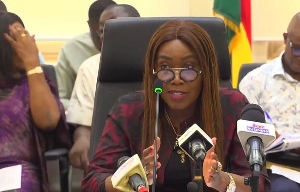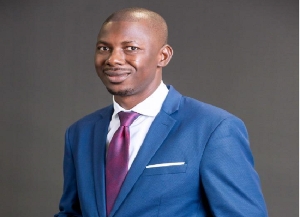- Home - News
- TWI News | TV
- Polls
- Year In Review
- News Archive
- Crime & Punishment
- Politics
- Regional
- Editorial
- Health
- Ghanaians Abroad
- Tabloid
- Africa
- Religion
- Election 2020
- Coronavirus
- News Videos | TV
- Photo Archives
- News Headlines
- Press Release
General News of Tuesday, 31 August 2004
Source: Chronicle
Parliament is not a money making place - MP
... You come in rich and go out poor
FOR MANY people, becoming a Member of Parliament (MP) is a guarantee of the enhancement of one?s financial standing. But a seasoned Fourth Republican legislator, Mr. Cletus Avoka, has sounded a note of caution to all fresh aspiring MPs to bear in mind that parliament was not a place for making money.
?If there is someone who is struggling out there to become an MP because of the conviction that being an MP is an opportunity to become rich, then such a person has gotten it all wrong. In fact, you come in probably rich and leave the house poorer than before becoming an honorable member,? said Mr. Avoka, MP since 1992, when the present constitution came into being.
Speaking in an exclusive interview with The Chronicle in Accra yesterday during which the paper sought his views on what many see as the unprecedented clamour by people to enter parliament, the Bawku West MP said there might be some people who were struggling to become MPs because of the wrong impression that the position would be the best opportunity for them to enhance their financial fortunes. However, he quickly pointed out that there were others who wanted to be members of the house because of several other reasons.
? In fact, it means a lot to be a member of parliament.
Indeed, you would be one among a lot of people to be addressed as ?Honorable? and apart from that there are other several privileges that one enjoys for reason of being an MP,? he stated.
Mr. Avoka, who was the Minister of Lands and Forestry during the regime of the National Democratic Congress (NDC), contended that for some of the incumbent parliamentarians, their desire to retain their seats might have been motivated by their conviction that being an MP was a status symbol, a prerequisite for becoming a Statesman.
?You see, if you are an MP you have that privilege of having the bills of your rent, electricity, fuel and others paid by the state and this cannot be denied as being among the principal reasons that motivate some people to consider the position of an MP as a good one,? he added.
He likened the position of MP to marriage in which those already into it wanted to leave while others yet to experience it, constantly struggled to find themselves in.
?It is said that curiosity kills the cat. As you might be aware, some of the current members of the house have voluntarily bowed out of this year?s contest but others out there are doing everything possible to secure the tickets of their respective parties to contest in this year?s elections with the ultimate ambition of getting the mandate of the electorate to represent them in parliament,? he pointed out.
On the current squabbles that had engulfed mainly the ruling NPP and to some extent NDC, the MP blamed the situation on the current flexible nature of the constitutions of the political parties with regards to how one qualifies to contest in the primaries.
He described as very unfortunate, the situation where some people presented themselves as party members only at the time when the parties opened nominations for parliamentary primaries.
Those were the people who caused confusion at the party primaries, he observed and suggested the need for the political parties to ensure that only people, who had been acknowledged by their party as being hard working, regardless of whether the party was in power or not, were allowed to contest in the constituency parliamentary primaries.
? There are some people who would not demonstrate their support for a party and work towards strengthening it but surface at the time of primaries as ?burgers and business tycoons? to influence delegates with money to win their votes.
He said when this happened people who had been working so hard would definitely be peeved and could resort to doing anything.
? Until the various political parties adhere to proper screening and strict procedures in the selection of candidates for constituency primaries, we will continue to have disagreements at primaries with all the worrying incidents that go with them,? the legislator emphasized.
He, however, rejected the suggestion by some political analysts that the current electoral college system used in selecting parliamentary candidates should be changed so that registered members of political parties in the constituency vote to elect their candidates.
He said such a procedure would be very costly and also had the tendency of resulting in further electoral complications.
The former minister, however, condemned the use of money to influence delegates in what has become popularly known as ?vote buying? during primaries.
He suggested that as a way of avoiding the practice, the political parties should consider increasing the number of delegates from polling stations who form the Electoral College to limit the possibility of contestants influencing them with financial inducements.
When The Chronicle asked the MP why the political parties preferred retaining their incumbent MPs, he stressed that it was important to have experienced legislators in the house so that bills would be properly scrutinized to ensure that good laws were made in the interest of the state.
?When you come to parliament for the first time, you would not be very conversant with the activities of the house and no political party would want to have majority of its MPs being first timers and inexperienced for that matter,? he explained.










